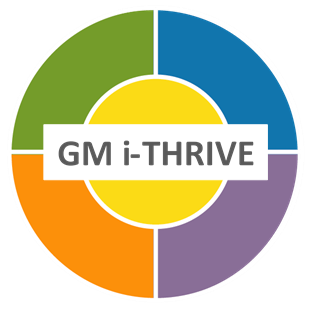
The Greater Manchester i-THRIVE Programme Team caught up with Dr Paula Hull, Consultant Clinical Psychologist, at Healthy Young Minds in Tameside and Glossop about their emotional health and wellbeing offer.
Download this implementation story.
Background
In 2016 Tameside and Glossop Healthy Young Minds (HYMs: Tameside’s CAMHS service) revised and aligned their Mood and Emotional Health Pathway with the THRIVE Framework for system change (Wolpert et al., 2019).
Healthy Young Minds developed:
- A THRIVE Model of Care
- Self-help resources
- Training for the wider system
Tameside and Glossop’s Mood and Emotional Disorder Pathway was developed to help support professionals working with children, young people and their families with emotional health and wellbeing difficulties.
Fig 1: Tameside and Glossop’s Provision for Children and Young People with Mood and Emotional Difficulties (MEDs)
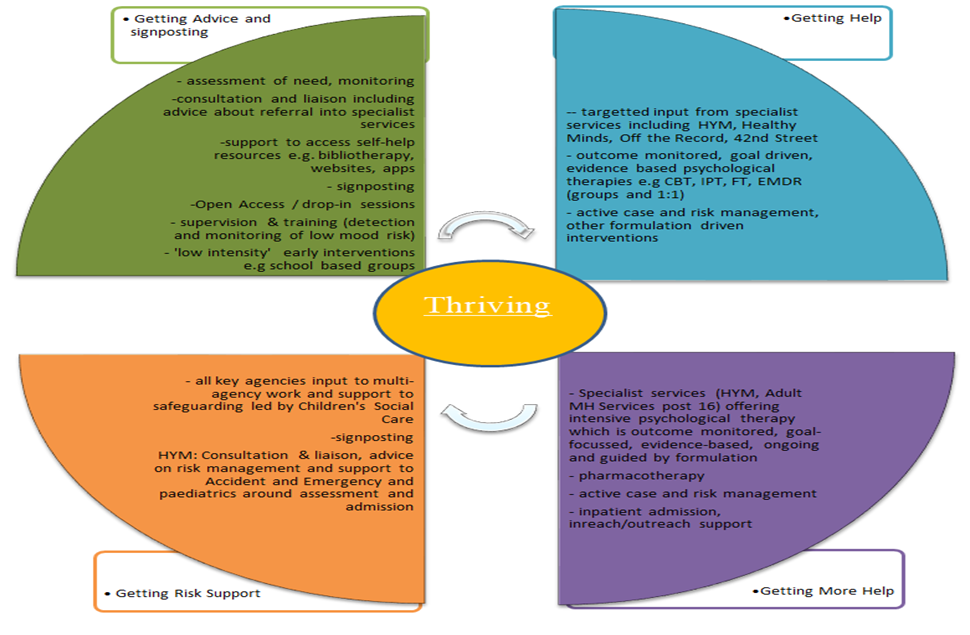
1. The THRIVE Model of Care
The THRIVE Framework for system change is a whole-system, needs based framework for supporting children, young people and their families. Tameside and Glossop mapped all their services across the CCG footprint that support children and young people in each of the THRIVE Framework needs based groupings. This was made into a ‘quick reference’ guide for professionals to have at hand when supporting shared decision making with children and young people when considering the most appropriate help and support services. The Tameside and Glossop THRIVE Model of Care is a great example of whole system working as it allows professionals to work across all the needs based groupings of the THRIVE Framework. The model also facilitates professionals to have knowledge of help and support available across the system, which enables them to effectively signpost children, young people and their families to the most appropriate services to meet their needs.
Fig 2: Example of the Tameside and Glossop THRIVE Model of Care
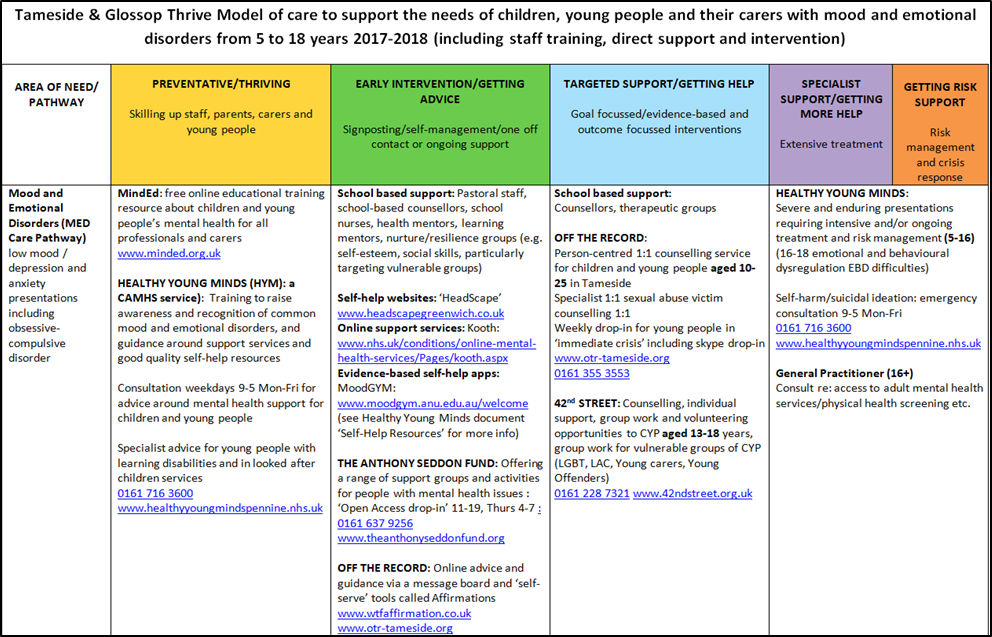
2. Self-help resource pack
There are a large number of self-help resources available for children and young people who want to manage their emotional health and wellbeing, however very few have been evaluated to establish their effectiveness. HYM’s set out to evaluate a sample of the self-help materials available. The self-help materials deemed more effective were compiled into a resource pack that was shared with the wider system. Self-help materials were evaluated against the following criteria:
- Having an evidence base (i.e. effective in clinical trials)
- Recommended by the NHS/Department of Health
- Stem from a highly reliable clinical source and have been reviewed and recommended by mental health professionals and organisations
- Highly recommended by young people or parents that have used the material
- Free and easily accessible
Some of the self-help resources found to be highly useful were; HeadScape, Kooth, Ayemind, Young Minds among others.
Fig 3: Tameside and Glossop self-help resource pack
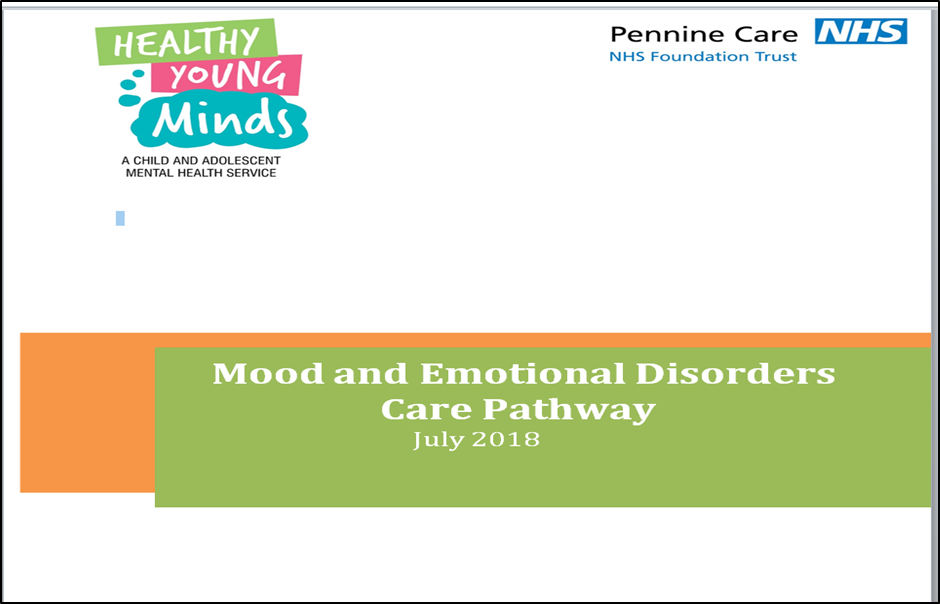
3. Training the wider system
To help build competence, confidence and capacity within the wider system to provide Getting Advice and Signposting, HYM’s practitioners delivered training to professionals in community settings such as education and social care.
The training covered an introductory session on low mood and anxiety difficulties, with professionals having an opportunity to reflect and think together about how they could effectively support children and young people with emotional health and wellbeing difficulties.
Typically, the difficulties identified would be mild presentations, or present when a child or young person has ended their involvement with more specialist services, and have chosen to self-manage their care.
Secondary schools in Tameside and Glossop have a named HYM’s link worker who offers supervision and consultation to staff working with young people. HYM’s representatives also attend an emotional wellbeing strategy group that meets regularly, and others offer support and consultation to Early Help teams. This is a commissioned service.
How does this relate to implementing the THRIVE Framework for system change in Tameside and Glossop?
Professionals in community settings across Tameside and Glossop have access to the THRIVE Model of Care self-help resource pack and training offer, as well as supervision and consultation for secondary schools. This provides the wider system with the knowledge and expertise to provide a more holistic ‘Getting Advice and Signposting’ offer.
Professionals in community settings are equipped with a strong understanding of the comprehensive network of community providers, and therefore are able to advice and signpost children, young people and their families appropriately. Professionals are equipped to support children and young people access and engage with self-management resources. This helps ensure children and young people are linked in with the right service to meet their needs, and can access appropriate information and self-help resources.
What have been the outcomes of this way of working?
Staff testimony and outcomes:
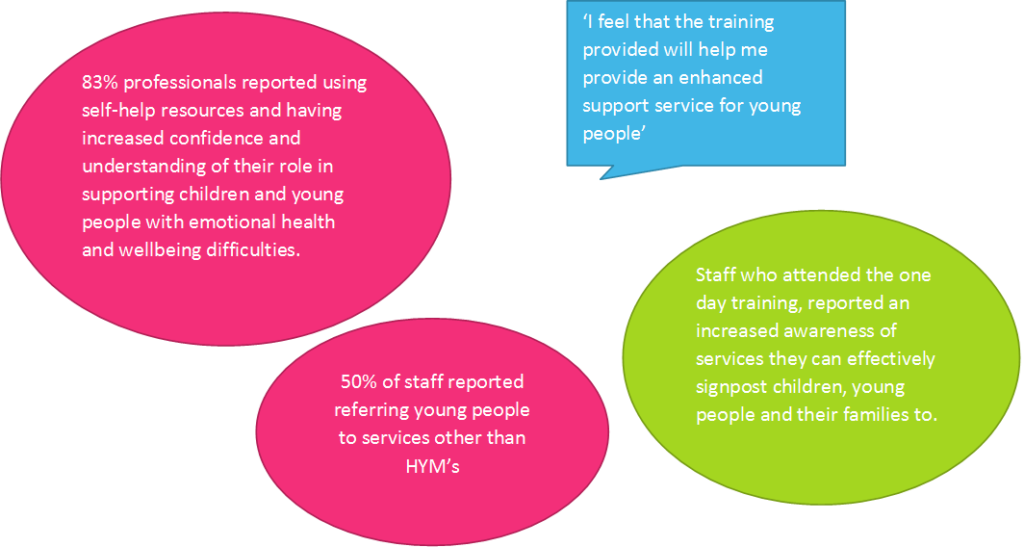
Training day outcomes:
The training day for wider system professionals was well attended with representation across sectors, including education, social care and voluntary services.
Professionals completed a survey at 3 points: before, immediately after training, and at 8 weeks follow up. These surveys found that the knowledge and skills gained during training day had been maintained after 8 weeks.
Fig 4: Survey outcome
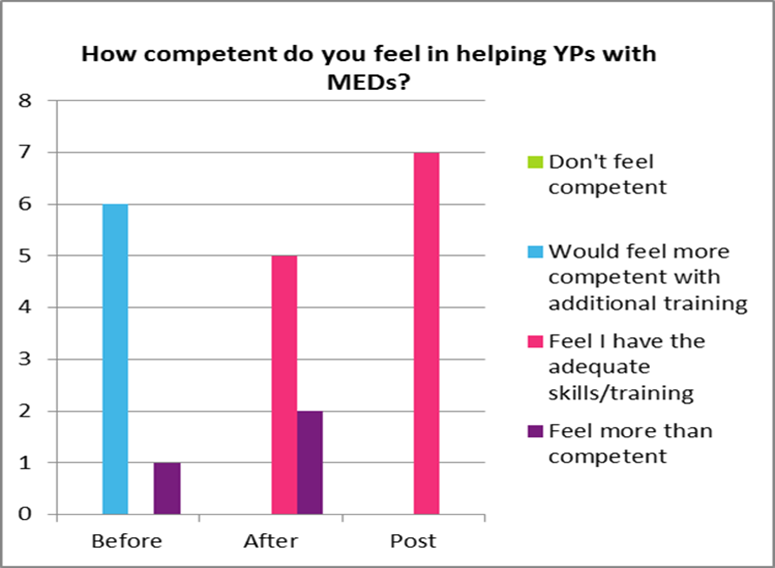
Future
Dr Paula Hull advises there is a need for regular updates to the Tameside and Glossop THRIVE Model of Care self-help resources, to ensure that information is up to date and relevant, when used by the children’s workforce.
HYM’s are looking to extend their offer in the Mood and Emotional Difficulties Pathway, by providing more training days for the wider system and continuing to provide consultation and supervision to the wider system. Further training days are currently being planned.
If you would like further information, please contact Paula Hull, Consultant Clinical Psychologist, paula.hull2@nhs.net.


Edited by the GM i-THRIVE Programme Team, and the National i-THRIVE Programme Team.
Written November 2019.